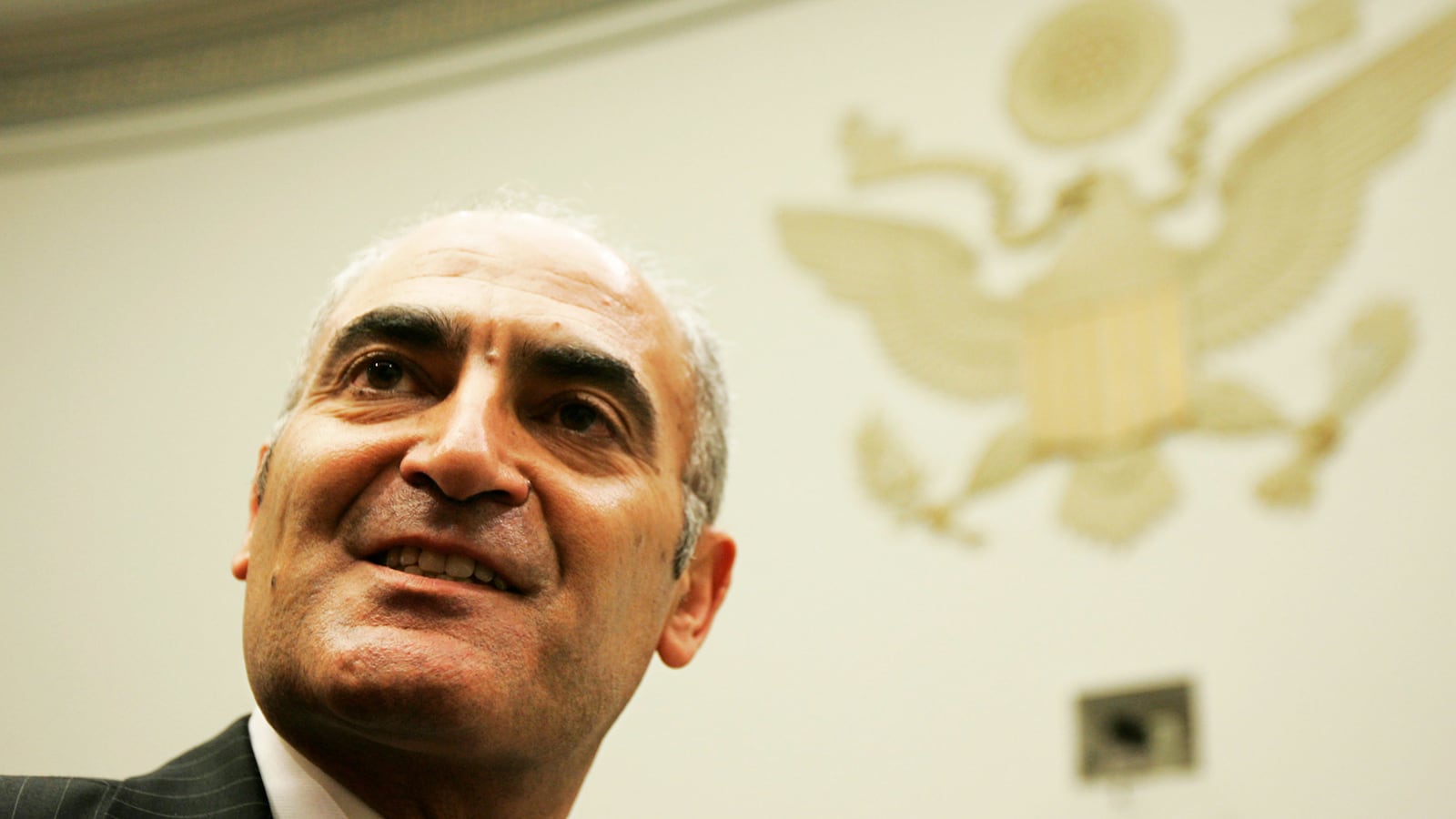In May, President Trump tapped Moncef Slaoui to become what was dubbed his “Coronavirus Czar” and lead Operation Warp Speed, the White House initiative to expedite a coronavirus vaccine. Along with Gen. Gustave F. Perna, Slaoui has set up temporary offices on the seventh floor of the Department of Health and Human Services to assemble plans to test new vaccines.
Slaoui is a molecular biologist and immunologist and was chairman of vaccines at GlaxoSmithKline (GSK), one of the world’s largest pharmaceutical companies, where he worked for 30 years. Industry leaders, predictably, praised the appointment, and watchdogs like Public Citizen said his background was too corporate. Meanwhile, experts have been concerned that Operation Warp Speed has issued no public standards or explanations for choosing vaccine candidates and may rush vaccines through approval.
An understanding of Slaoui’s biography and his time at GSK may add to those concerns. While working for the Pharma giant, Slaoui helped misrepresent scientific research on a drug that had harmed tens of thousands of Americans. Since the Trump administration has shifted its COVID-19 strategy to favor vaccine development, this means America’s hopes for addressing the pandemic rests with someone who was at the epicenter of one of the more controversial episodes in recent drug development.
Back in 2007, Avandia was GSK’s $3 billion-per-year blockbuster diabetes drug, when Dr. Steve Nissen of the Cleveland Clinic published a study in the New England Journal of Medicine that found that it increased the risk of heart attacks and deaths in patients. With the future of Avandia in doubt, the company’s share price fell 7 percent, wiping out billions of dollars of value. GSK was in a serious bind. But instead of opening its books, it responded by misleading the public, federal agencies, and Congress about the drug’s dangers. Slaoui helped the company in this deception. At the time, he was GSK’s chairman of research and development, and when he was hauled before Congress to testify to Avandia’s safety, he offered a rosy assessment that downplayed the drug’s risks.
“[N]ot only is Avandia effective, it is actually superior to the most widely used medicines” Slaoui testified at one point, adding at another: "We also diligently communicated to physicians and patients Avandia's scientifically established safety risks."
I know this, because I was the U.S. Senate Finance Committee’s lead investigator on the bipartisan investigation of GSK and Avandia, and our reports found that GSK had bullied critics of the drug, hid data, and misled the public. By testifying before Congress and the American public that the drug was fine and by working with his colleagues to undermine a study that found it was dangerous, Slaoui assisted GSK’s strategy to deny the drug’s dangers, which ultimately led to a $3 billion federal fine to settle criminal and civil liability related to several of the company’s drugs, including Avandia. The month after Slaoui testified, FDA scientists presented an analysis estimating that Avandia had caused approximately 83,000 excess heart attacks in America since coming on the market.
In a statement to The Daily Beast, Health and Human Services spokesperson Michael Caputo defended Slaoui from accusations that he’d acted unethically: “Any allegation that Dr. Moncef Slaoui lied to Congress is blatantly false, defamatory per se and begging for legal action, so you should probably lawyer up.” A GSK spokesperson, meanwhile, insisted that the company had “acted appropriately and responsibly in its management of Avandia.”
“With respect to Dr. Slaoui, the testimony provided by Dr. Slaoui back in 2007 was—and remains—accurate,” the spokesman added.
At the time when it hit the market, Avandia was hailed as a major breakthrough for patients with type 2 diabetes, promoted even as a safer alternative to other drugs on the market. But there were warning signs early on about the cardiovascular risks that came with the medication—warnings that made their way to the FDA.
When the NEJM published its Avandia study in May 2007, our committee and two House committees launched investigations.
Slaoui and GSK were defiant. During a later House hearing, Slaoui testified that the NEJM editorial “cherry-picked data points when the data taken as a whole supports the safety profile of Avandia,” and he alleged that GSK “communicated diligently with the FDA.” In fact, the story was quite different. The Senate Finance Committee found that GSK’s own scientists had reviewed the NEJM study and found it statistically sound, and the company later pleaded guilty for failing to report safety data about Avandia to the FDA.
Much of Slauoi’s testimony was not fully forthright, as we documented through emails made public in our 342-page committee report that we released a few years later. This report took so long because I had to personally review over 250,000 pages of documents submitted to the Committee by GSK, FDA, and several research institutes. It took hundreds of hours to do this, followed by review by Committee experts, as well as Senate legal counsel. Slaoui is one of only a handful of GSK executives named in the report.
After reading the report, Yale cardiologist Harlan Krumholz wrote that it "read like a spy novel.” Analysts at UBS predicted that GlaxoSmithKline could face legal liability of up to $6 billion. But this was only partly about money; experts also warned that tens of thousands of people were harmed by the drug.
For GSK, the NEJM study finding harm was a massive problem. But how they reacted to it made matters even worse. When a scientist submits a study to a journal, that journal’s editors have the manuscript reviewed by outside experts called peer reviewers. As we documented in the Senate Finance report, shortly after Dr. Nissen of the Cleveland Clinic submitted his paper on the dangers of Avandia to the NEJM on May 2, 2007, a peer reviewer breached the journal’s ethical rules and leaked the study to GSK. This gave the company several weeks to go over the study and prepare a public relations campaign to undermine it, all before it was made public. And that’s precisely what they did, circulating the paper to dozens of GSK’s executives to analyze.
This all transpired as, internally, the company recognized that the NEJM findings were sound. On May 4, GSK produced a detailed eight-page internal analysis of Nissen’s unpublished results. GSK’s own statistician wrote: “there is no statistical reason for disregarding [Nissen’s] findings as presented.”
Slaoui was aware of all of this. On May 8, he emailed his GSK colleagues about other studies that had similar results to Nissen’s study, writing: “F.D.A., Nissen and G.S.K. all come to comparable conclusions regarding increased risk for ischemic events, ranging from 30 percent to 43 percent!” (Ischemic events are another way of saying “heart attacks.”)
Slaoui also noted that all three studies found an increased risk of death, indicating that he and the company already knew of Avandia’s risks.
Nissen’s NEJM research still hadn’t been published, but over email (which we obtained) Slaoui strategized how GSK could cite other studies to convince the FDA of Avandia’s safety. In one example, Slaoui emailed his colleagues: “[W]hat studies could we offer the FDA to further assess the contradictory data between the integrated study and the two others?”
On May 9, GSK began drafting “key messages” to undermine Nissen’s study, which still had yet to be published. “[W]e are not seeing a proven link between Avandia and increased cardiovascular deaths,” wrote GSK’s vice president for corporate media relations, in one example.
A GSK consultant then emailed Slaoui: “We cannot undermine the numbers but I think they can be explained so we must concentrate on effective risk management.”
Our investigation led us to conclude that GSK knew and acknowledged that their drug carried risk but decided to run a PR campaign to keep the public less frightened about it. “The company’s own experts analyzed the study, found it to be statistically reliable, and then attacked the soundness of that study in press releases and public comments,” we concluded in the Senate Finance Report.
After analyzing Nissen’s leaked NEJM study and finding no statistical reason for disregarding it, GSK officials flew to Cleveland to meet with Nissen, on May 10, 2007. Nissen still had not yet actually published his study in NEJM.
The GSK officials acted as if they hadn’t seen a copy of Nissen’s study and discussed a possible collaboration with him. Nissen recorded the meeting and gave the audio file to the New York Times. The Times wrote that Nissen warned the company: “You’ve got a bunch of people who are incredibly vulnerable to myocardial ischemia, and you’ve had evidence that you’re provoking ischemia in those people, and that is of grave public health consequences.” At one point in the meeting, Nissen told the company that Avandia should be pulled from the market. As Nissen saw it, the executives hoped to persuade him to not publish his study.
Slaoui was not at this meeting, but he testified weeks later to Congress, as GSK’s representative, that Avandia was fine and used the forum to cast doubt on Nissen’s findings.
“The studies that we, the FDA and Dr. Nissen have put into the meta-analyses, the raw materials, if you wish, on which the technology acts, were not designed to look for cardiovascular events. You have heard experts here talking about adjudication of cases. The cases were not adjudicated,” he said. “So the starting material, the raw material, is not designed for the question that is being asked. The right way to ask the question, Congressman, are prospective controlled large studies. We have three of them. The three studies do not show a significant increase in cardiovascular events.”
Five months after our 2010 committee report documenting Slaoui’s emails, the FDA held another Avandia hearing. That same day, GSK agreed to a $460 million settlement with 10,000 Americans who sued the company for withholding Avandia’s heart attack risks. The company “can’t be trusted to report adverse clinical results fairly,” the New York Times editorialized.
In 2012, GSK pleaded guilty and agreed to pay a $3 billion fine to resolve criminal and civil liability due to unlawful promotion of certain prescription drugs, and its failure to report safety data on Avandia. It was the largest federal penalty paid by a pharmaceutical company in the history of our nation.
That November, the company paid an additional $90 million to resolve lawsuits brought by 38 state attorneys general to settle claims that GSK unlawfully marketed Avandia, and GSK agreed to refrain from making false, misleading, or deceptive claims about any diabetes drug.
Neither Slaoui nor any of his colleagues were named in these civil or criminal settlements, but he helped steer the company’s strategy and publicly downplayed any risks to the American people, who GSK hoped would keep using the drug.
The problems with the drug continue to this day. Just last February, a study in BMJ confirmed that Avandia is linked to heart troubles, and the medication is now rarely used.
None of this seems to have stuck to any GSK executive, including Slaoui. According to his bio posted by Health and Human Services, Slaoui served on the advisory committee to the director of the National Institutes of Health from 2011 to 2016. In 2017, he retired from GSK, and became a partner at a venture capital firm and joined the board of a biotechnology firm. Politico reported that HHS Secretary Alex Azar, White House coronavirus coordinator Deborah Birx and Trump’s son-in-law Jared Kushner were key players in choosing him for this position.
There are many vaccine experts in America with reputations for integrity. In the face of the most dangerous disease confronting the country today, why would Trump ask the public to trust someone with this past?
Paul D. Thacker is a journalist living in Spain. From 2007 to 2010, he was an investigator for the United States Senate Finance Committee, where he worked on corruption in science and medicine.





